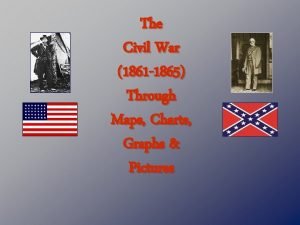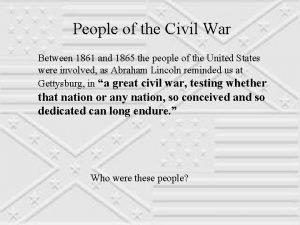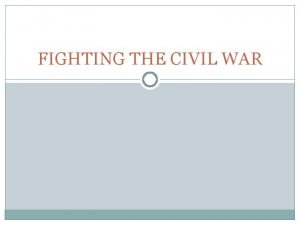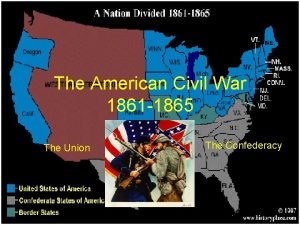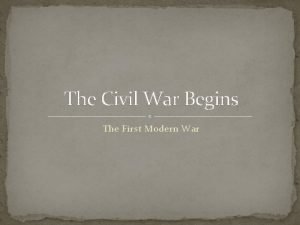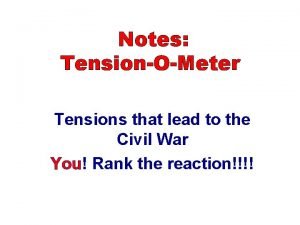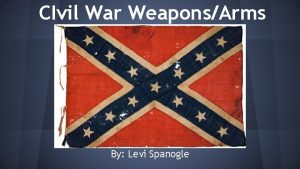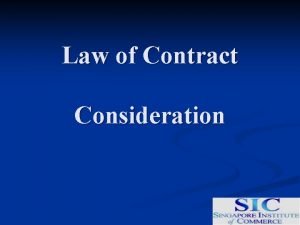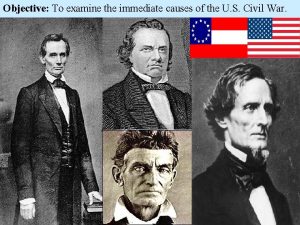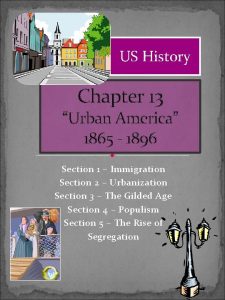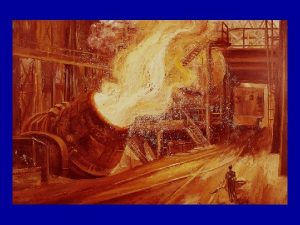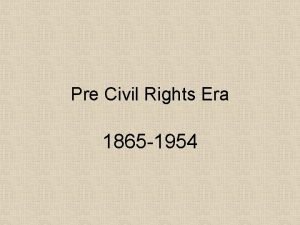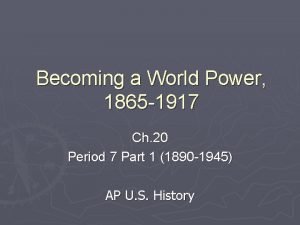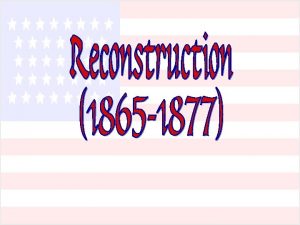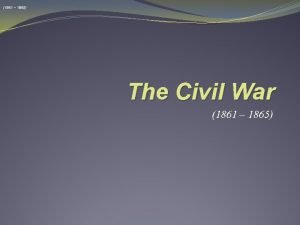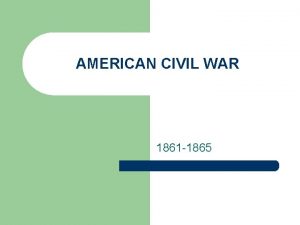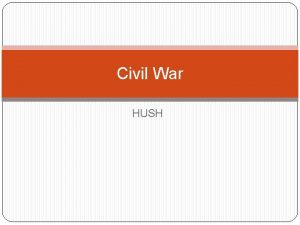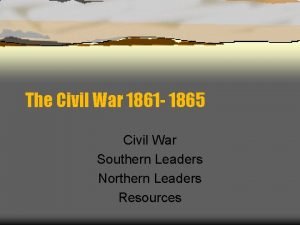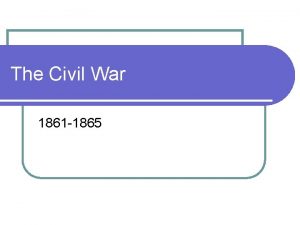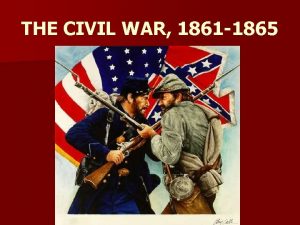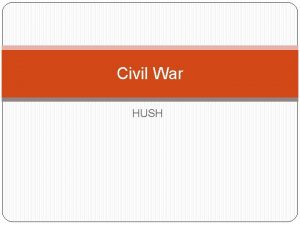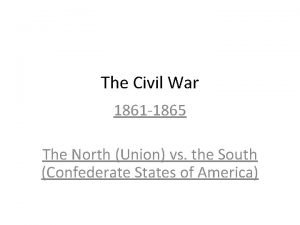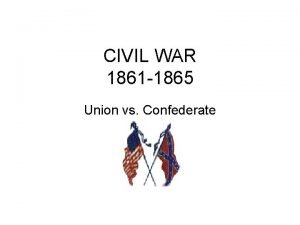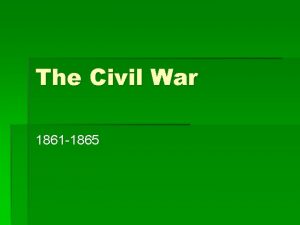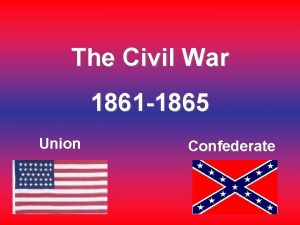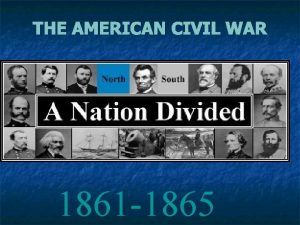A Union Divided The Civil War 1861 1865




























- Slides: 28

A Union Divided: The Civil War 1861 -1865

A Long Overdue War • The Civil War was the culmination of 40 years of tensions between the North and the South • While the moral issue of slavery was at the heart of the Civil War, the war was about more than this one issue • The war was about two different views of America and two very different ways of life…

The South • The South – Large plantations and farms – Required slaves to sustain their economy – Without slaves economy would collapse

The North • • • Major cities with industry and banks 9 out of 10 largest cities in the North Over double the population of the South Twice as many railroad and telegraph lines This means better communication

Very Different Ways of Life • South wanted to maintain their “Southern way of life” (which required slavery) • North wanted to eliminate slavery and most importantly keep the country united

Presidential Election of 1860 • The election of Abraham Lincoln in 1860 basically guaranteed that some Southern states would leave the Union • Many Southerners were insulted by the election since virtually no one in the South had voted for Lincoln and he did not win a single southern state

Secession • Despite repeatedly stating that he only wished to contain slavery in the new territories and not end it in the South, most Southerners did not believe him • As a result, South Carolina quickly decided to secede (withdraw) from the Union • Over the next 6 weeks, legislatures in 6 other states decided to do the same (Mississippi, Georgia, Florida, Alabama, Texas and Louisiana)

The Confederate States of America • In February of 1861, representatives of these 7 states met to create the Confederate States of America (or the Confederacy) • Jefferson Davis was elected as their president • The only question remaining was where and when the first shots between the North and the South would actually be fired

Fort Sumter – Where the Civil War began • Federal fort in harbor of Charleston, SC • Newly formed Confederate govt. needed control of Federal forts in the South • On April 12, 1861 they attacked Fort Sumter which surrendered 34 hours later • Lincoln called for Federal troops to respond which was interpreted as an act of war by the South

5 Strengths of the Union (North) • More men for the army (2/3 nation’s popul. ) • Far more money in its banks • Double the RR tracks & telegraph lines (why important? )

Northern Strengths • Double the factories (produce more guns, ammo, shoes, other stuff for the war) • Already a functioning Govt. up and running

4 Strengths of the Confederacy (South) • Most of the best trained generals (incl. Robert E. Lee) were Southerners (smaller, but better army) • Did not have to attack (just wait and defend)

Southern Strengths • Home field advantage (knew the terrain) • Had more passion (fighting to defend their way of life)

Northern Strategy • Choke off the Confederacy by blocking ports and the Mississippi River so the South couldn’t trade with Europe or import manufactured goods they needed (the Anaconda Plan) • Cut the Confederacy in half by controlling the Mississippi

Southern Strategy • Prepare and Wait • Didn’t need to win, just had to defend • A war of attrition – inflict continuous losses until Northerners lose the will to fight

A Long War • Newspapers in both the North and South declared the war would be over by Christmas of 1861, but they were mistaken • The North thought they were superior and the South thought the North would lose their will, but in the end they did not

The Battle of Bull Run • The capital of the Confederacy was moved to Richmond, VA, after Virginia joined the Confederacy • Northern newspapers issued cries of, “On to Richmond!” • On July 21, 1861, at the First Battle of Bull Run, Union forces retreated in chaos back toward Washington • After this battle, the North realized that victory in this war would not be as easy as they initially thought it would be

Battle of Gettysburg • In the early part of the war the South had some success, but as the war dragged on it became more apparent that the North would win • Perhaps the turning point was the Battle of Gettysburg, in which Lee was defeated by the Union army in the bloodiest overall battle of the war (24, 000 deaths in the North and 28, 000 in the South)

The Toll of the War • Besides the increasing death toll, the war took a psychological tour on the soldiers • With dwindling numbers, General Lee increased the requirement from one to three years of service and extended the draft to all white men from ages 18 to 45 (originally 35) • Many southern soldiers deserted the army to return home to help their families

Draft Riots • In the North, they protested the unfair draft that allowed the rich to pay $300 to avoid going or to hire a “replacement” soldier (usually Irish immigrants) • Riots broke out in NYC in 186, leading to the death of 200 people (mostly black) • Many did not want to take part in a war that would free slaves who they perceived as competitors for their jobs

The Emancipation Proclamation • On January 1, 1863, Abraham Lincoln issued the Emancipation Proclamation which freed slaves in territories controlled by the Union army • This gave Northerners a moral justification to continue fighting and dashed any hopes that England might enter the war to aid the Confederacy (since England opposed slavery)

Black Soldiers • Blacks were not accepted into the Union army at the beginning of the war. • After the Emancipation Proclamation, many ex -slaves from the South and free blacks from the North joined the Union Army • Black soldiers had to fight in all black units with white officers • The 54 th Massachusetts Infantry (film Glory)

Why the North Won • The surrender of the Confederacy in April 1865 was caused by a severe lack of morale, manpower, and economic stability in the South • While the South had food shortages, the North had farms and factories to produce what they needed and enough men to continue fighting

Lincoln’s Assassination • John Wilkes Booth – a Confederate sympathizer shot and killed Lincoln on April 14, 1865 as he watched a play at Ford’s Theater in D. C. • While he had begun to plan for what a post. Civil War America would look like, Lincoln would not live to see the end of the war


John Wilkes Booth • Booth and a group of co-conspirators also planned to kill Vice President Andrew Johnson and other members of the President’s cabinet • Booth was hunted down several days later and was killed by gunfire; several others conspiring with him were found and, after trials, hanged

Deadliest American War in History • Approximately 620, 000 Americans died during the Civil War • Until the Vietnam War, that number was more than all other American wars combined (which is now approx. 644, 0000) • Perhaps the greatest tragedy is that the deaths during the Civil War came at the hand of other Americans

American Deaths in Wars
 Civil war 1861/1862
Civil war 1861/1862 Civil war 1861/1862
Civil war 1861/1862 Civil war union strategy
Civil war union strategy Anaconda plan civil war
Anaconda plan civil war Why was the civil war considered the first modern war
Why was the civil war considered the first modern war Toward civil war lesson 3 secession and war
Toward civil war lesson 3 secession and war Tensionometer
Tensionometer Unionistička stranka 1861
Unionistička stranka 1861 Springfield model 1861 rifle facts
Springfield model 1861 rifle facts England v davidson (1840)
England v davidson (1840) John brown poster
John brown poster Indian councils act 1861
Indian councils act 1861 Union union all intersect
Union union all intersect Union civil protection knowledge network
Union civil protection knowledge network Servinacuy definition
Servinacuy definition Civil rights and civil liberties webquest
Civil rights and civil liberties webquest Realism regionalism and naturalism
Realism regionalism and naturalism Becoming a world power 1865-1917
Becoming a world power 1865-1917 Al cruzar una planta de guisantes de flores purpura
Al cruzar una planta de guisantes de flores purpura Four features of industrial manufacturing (1865-1900)
Four features of industrial manufacturing (1865-1900) What are characteristics of impressionism
What are characteristics of impressionism Urban america 1865 to 1896
Urban america 1865 to 1896 Industrialization (1865 to 1901 worksheet answers key)
Industrialization (1865 to 1901 worksheet answers key) Where does the term impressionism come from
Where does the term impressionism come from 1954-1865
1954-1865 Chapter 20 becoming a world power notes
Chapter 20 becoming a world power notes Hollywood silver fox farm v emmett
Hollywood silver fox farm v emmett 1865 to 1900 inventions
1865 to 1900 inventions 1877-1865
1877-1865
